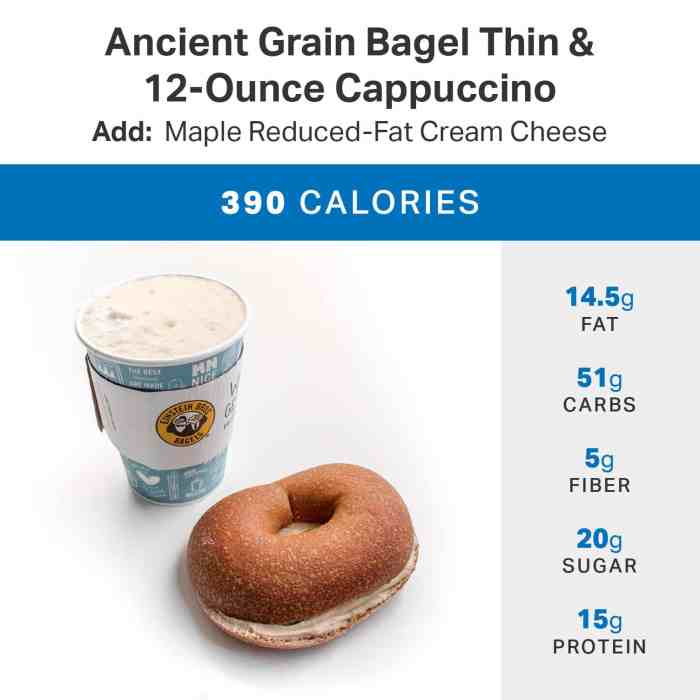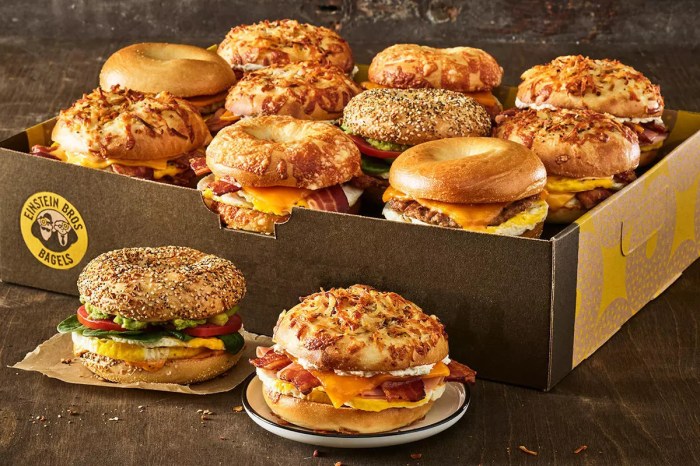Einstein Bagels Nutritional Composition

Einstein bagels nutrition facts – Okay, Medan peeps, let’s get real about those Einstein Bagels. We all love ’em, but knowing what’s inside is half the battle, right? This ain’t about judging, it’s about making informed choices for that ultimate
enak* experience.
Right, so you’re looking at Einstein bagels nutrition facts, yeah? Trying to work out if that poppy seed one’s going to totally wreck your diet? Well, before you even think about it, check out the costco pizza nutrition facts – that’ll give you a proper perspective on portion sizes. Then, you can get back to agonizing over whether another Einstein bagel is a good idea.
Macronutrient Breakdown per Serving
This table shows the approximate macronutrient content per serving for some popular Einstein Bagel flavors. Remember, these are estimates and can vary slightly depending on the specific bagel and preparation. Always check the most up-to-date nutritional information on the Einstein Bros. Bagels website or packaging.
| Bagel Type | Carbohydrates (grams) | Protein (grams) | Fat (grams) |
|---|---|---|---|
| Plain | 55-60 | 8-10 | 2-3 |
| Everything | 55-60 | 8-10 | 3-4 |
| Poppy Seed | 55-60 | 8-10 | 2-3 |
Micronutrient Content in a Typical Einstein Bagel
While not a powerhouse of vitamins and minerals, Einstein bagels do offer some essential nutrients. The quantities will depend on the specific type of bagel and the ingredients used. These are general estimates.
- Iron: A small amount contributes to red blood cell production and oxygen transport.
- B Vitamins (Thiamin, Riboflavin, Niacin): Involved in energy metabolism and various bodily functions. The quantities vary depending on the bagel type.
- Folate: Important for cell growth and development, especially during pregnancy.
- Calcium: Contributes to bone health; amount is relatively small.
Fiber Content and Health Benefits
Fiber is your digestive system’s best friend, helping with regularity and overall gut health. The fiber content in Einstein bagels varies slightly depending on the type and the added seeds or grains.
Generally, you can expect around 2-4 grams of fiber per bagel. While not the highest fiber option, incorporating a bagel into a balanced diet with plenty of fruits, vegetables, and whole grains can still contribute positively to your daily fiber intake. Adequate fiber intake is associated with reduced risk of heart disease, type 2 diabetes, and certain types of cancer.
Calorie Content and Serving Sizes: Einstein Bagels Nutrition Facts

Yo, Medan peeps! Let’s get real about those Einstein Bagels and the calorie count. We’re diving deep into the numbers, breaking down the different sizes and types, and comparing them to other breakfast faves. Get ready to fuel your day the smart way!
Understanding calorie content and serving sizes is crucial for managing your daily intake. Einstein Bagels offer a variety of options, each with its own nutritional profile. This information helps you make informed choices about your breakfast and overall diet.
Einstein Bagel Calorie Breakdown
Here’s a table breaking down the calorie counts for some popular Einstein Bagel choices. Remember, these are estimates and can vary slightly depending on preparation and specific ingredients.
| Bagel Type | Serving Size | Calories | Calories per gram |
|---|---|---|---|
| Plain Bagel (Small) | 70g | 180 | 2.6 |
| Plain Bagel (Large) | 110g | 280 | 2.5 |
| Everything Bagel (Small) | 75g | 200 | 2.7 |
| Asiago Bagel (Large) | 120g | 320 | 2.7 |
| Cinnamon Raisin Bagel (Small) | 65g | 190 | 2.9 |
Calorie Density Comparison
Let’s compare Einstein Bagels to other common breakfast choices. This helps put the calorie count in perspective and allows for better decision-making.
- Einstein Bagel (Plain, Small): Around 180 calories. This is comparable to a medium-sized muffin or two slices of whole-wheat toast.
- Muffin (Blueberry, average): Can range from 250-350 calories, generally higher than a small plain Einstein Bagel.
- Toast (2 slices whole wheat): Approximately 150-200 calories, depending on the bread and toppings.
Calorie Impact of Toppings
Adding toppings significantly impacts the overall calorie count. Let’s see how much those extra goodies add up!
| Topping | Added Calories (approx.) | Total Calories (with Bagel – Small Plain) | Nutritional Impact |
|---|---|---|---|
| 1 tbsp Cream Cheese | 50-70 | 230-250 | Adds fat and protein; increases calorie density. |
| 1 tbsp Butter | 100 | 280 | Significantly increases fat and calorie content. |
| 1 oz Smoked Salmon | 70-90 | 250-270 | Adds protein and healthy fats; increases overall calories. |
Nutritional Implications and Health Considerations

Einstein Bagels, like any other processed food, presents a bit of a culinary double-edged sword, Medan style. While they offer convenience and a satisfying taste, understanding their nutritional profile and how they fit into your overall diet is key to enjoying them without compromising your health goals. Let’s break down the good, the bad, and the “how-to” for incorporating these bagels into a balanced eating plan.
Regular consumption of Einstein Bagels, especially in larger portions, can contribute to a higher calorie intake, potentially leading to weight gain if not balanced with sufficient physical activity and a generally healthy diet. The high carbohydrate content, while providing energy, can also spike blood sugar levels, particularly in individuals with diabetes or insulin resistance. However, the bagels also offer some nutritional benefits, including fiber (depending on the type of bagel), which aids digestion and can contribute to feelings of fullness.
The nutritional value varies significantly depending on the type of bagel chosen and any added toppings. For instance, a whole-wheat bagel will offer more fiber and nutrients compared to a plain white bagel.
Recommendations for Incorporating Einstein Bagels into a Balanced Diet, Einstein bagels nutrition facts
To maximize the potential benefits and minimize the drawbacks of Einstein Bagels, mindful consumption is crucial. Consider these recommendations to ensure they become a part of a healthy, well-rounded diet, rather than a dietary downfall.
- Portion Control: Stick to one bagel per serving. Avoid the temptation of consuming two or more, especially if you’re watching your calorie intake.
- Choose Wisely: Opt for whole-wheat or multigrain bagels over plain white bagels. These options generally offer higher fiber content and more nutrients.
- Mindful Toppings: Load up on healthy toppings like avocado, tomato slices, or a small amount of cream cheese (low-fat options are preferable). Avoid excessive amounts of sugary spreads or high-fat meats.
- Balance Your Meal: Pair your bagel with a side of fruits or vegetables to increase the nutritional value of your meal and add fiber and vitamins.
- Listen to Your Body: Pay attention to your hunger and fullness cues. Don’t eat just because the bagel is there. Stop when you feel comfortably satisfied.
Alignment with Dietary Guidelines
The nutritional content of Einstein Bagels can be assessed against established dietary guidelines, like those from the USDA. The key is to consider the bagel as one component of a larger, balanced dietary pattern. A single Einstein bagel might contribute significantly to your daily carbohydrate intake. Therefore, careful planning of the rest of your meals is essential to ensure you’re meeting your recommended daily intake of fruits, vegetables, proteins, and healthy fats while staying within your calorie goals.
For example, the USDA recommends focusing on a diet rich in fruits, vegetables, whole grains, and lean protein. While an Einstein bagel can fit into this framework (especially the whole-wheat varieties), it shouldn’t be the cornerstone of your daily diet. It’s important to remember that moderation and balance are key to maintaining a healthy lifestyle.
FAQ Corner
Are Einstein Bagels gluten-free?
No, traditional Einstein Bagels contain wheat flour and are not gluten-free.
What is the best way to store Einstein Bagels?
Store them in an airtight container at room temperature for optimal freshness. For longer storage, freeze them.
Do Einstein Bagels contain preservatives?
Check the ingredient list on the specific bagel packaging for details on preservatives used. Many contain common preservatives to extend shelf life.
How many carbs are in an Einstein Bagel compared to a regular bagel from another brand?
Carb content varies by bagel type and brand. A direct comparison requires reviewing the nutritional information for specific bagel types from different brands.
